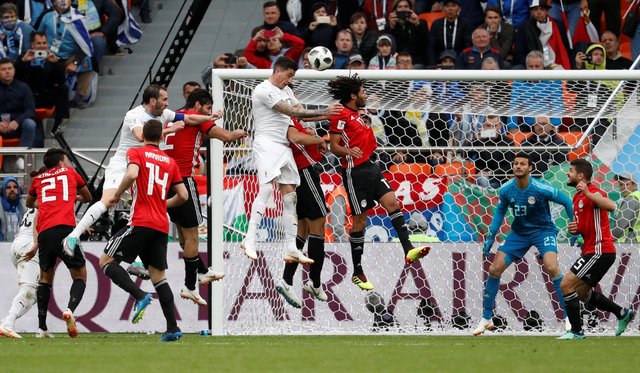
Egypt 0 Final 1 Uruguay
YEKATERINBURG, Russia — There were no words needed when the two strangers, one Russian, the other Egyptian, crossed paths on a downtown street here late Friday morning.
The Russian man pointed at his shoulder, raised his eyebrows and tilted his head. The Egyptian man nodded, took a deep breath and shrugged. They then smiled as they parted ways.
The silent gesticulations, of course, concerned Mohamed Salah, the ascendant global soccer star whose injured left shoulder has been the most talked-about body part of the 2018 World Cup. Egypt would play its first World Cup game in 28 years later that day, and questions remained about whether the team could call upon the talents of its best player.
[Up Next: Spain vs. Portugal Live Coverage]
“We are following his news every hour, every day: How is he doing? Is he better?” said Ehab Shokry, 43, of Hurghada, Egypt, once the Russian fan he had encountered continued down the sidewalk. “We weren’t expecting that he would play, but we heard his injury has improved. So, we hope.”
But the hope, for one game, at least, was dashed. Salah did not play, and Egypt watched a workmanlike performance go to waste when Uruguay defender Jose Gimenez scored on a dramatic 89th-minute header to propel his team to a 1-0 victory at Ekaterinburg Arena.
On Thursday, Egypt’s coach, Hector Cuper, said he was almost certain that Salah, who hurt his shoulder during the Champions League final on May 26, would play against Uruguay. But on Friday, an hour before kickoff, the official lineups showed that Salah would begin the match on the bench.
Still, Salah’s presence was felt everywhere. It seemed like every Egyptian jersey in the crowd featured his name. Fourteen minutes into the match, his face appeared on the big screen, drawing a huge cheer from the crowd. And every Egyptian attack that fizzled raised questions about whether he could have made a difference.
In the second half, with the game still scoreless, Cuper exhorted his players forward, punching the air, spinning around in agony and disbelief whenever they lost the ball. But he never summoned Salah.
“Mo Salah is an extremely important player for us, that’s beyond any shadow of doubt, nobody can deny,” Cuper said afterward. “Perhaps if Mo had been on the pitch, the outcome would have been different, but we can’t know that.”
Cuper was not the only one visibly frustrated; Luis Suarez, the Uruguayan star who plays for Barcelona, had anguish written on his face all game, thanks to the persistent heroics of Egyptian goalkeeper Mohamed El-Shenawy.
Early in the second half, Suarez fired a shot across his body toward the left post of the Egyptian goal, but El-Shenawy got his right knee in the way. Suarez kicked the advertising board in anger.
In the 73rd minute, Suarez found himself one-on-one with El-Shenawy again. Suarez twinkled his toes trying to dribble around the challenge, but he couldn’t get his steps right, and El-Shenawy vacuumed the ball off Suarez’s feet. With less than 10 minutes left to play, El-Shenawy made his best save of the night, lunging to his left, his body parallel to the ground, to block a powerful shot from Edinson Cavani, another of Uruguay’s elite attackers.
In the end it was a defender who made the difference, as Gimenez rose above a crowd to put his forehead to a corner kick and smash the ball into the right corner of the goal. As the Uruguayan players swarmed and smothered Giminez, Salah stared into the near distance, then dropped his chin to his chest.
The run-up to every World Cup has at least one high-profile fitness race: some star still smarting as the games approach, some muscle or bone receiving prayer and blessings from an entire nation, some fan base counting the minutes the player has left to heal.
In 2002, for instance, it was David Beckham, whose left foot became an English national obsession after he broke it two months before the World Cup. Four years later, it was another English star, Wayne Rooney, and another broken foot. Neither player looked like himself during the tournament.
In 2010, Andres Iniesta was a risky addition to Spain’s roster given that he had played less than 30 total minutes for Barcelona in the final two months of the season. He scored the winning goal in the World Cup final. Four years later, Radamel Falcao of Colombia narrowly lost his own race to recover from a knee injury after carrying his team through the qualifying process.
Cuper reiterated after Friday’s game that he had been “quite certain” during the team’s training session on Thursday that Salah would play. But after the practice, he said, team doctors examined Salah in depth and determined that he was still at risk for further injury. “We decided not to take that risk,” Cuper said, “because we want to be sure we can have him in top form for our matches against Russia and Saudi Arabia.”
A draw against Uruguay would have validated his plan, giving Egypt a point against the group’s best team with two games against inferior teams to play. Now they will lean even more heavily on Salah and his still questionable shoulder.
Here’s how Uruguay beat Egypt:
There is no doubt that Uruguay is far better team than Egypt
Downvoting a post can decrease pending rewards and make it less visible. Common reasons:
Submit